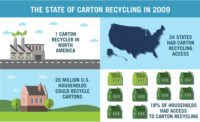Why Sustainability Matters for Brands and How Cartons Can Help


67% of US adults would assume a package is not recyclable if there is no recycling symbol or language on it.

91% of US adults expect food and beverage brands to actively help increase the recycling of their packages.

28% look to the product's company website for recycling information.

57% look to the product's packaging first to determine if a product is recyclable.

The ReWall Company, a Carton Recycling Champion, takes full advantage of cartons’ environmental benefits. They utilize the entire recycled carton to make green building products like backer board and ceiling tiles.






Looking for a reprint of this article?
From high-res PDFs to custom plaques, order your copy today!










